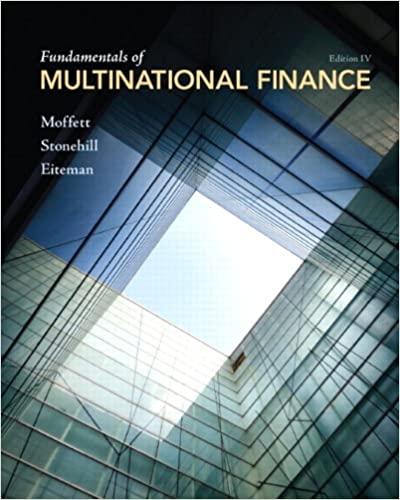Question
1) What does beta represent? A. Indiviudal company risk against market risk B. Systematic risk for the company C. Unsystematic risk of the company D.
1) What does beta represent?
A. Indiviudal company risk against market risk
B. Systematic risk for the company
C. Unsystematic risk of the company
D. Varabiity of returns for the company
2) The purpose of stock valuation is to:
A. To set a fair market value (FMV) for a given common stock
B. To determine whether the vlaue of a common
stock is fairly represented by its market price
C. Of limited value since the efficient market hypothesis proves that all common stock is always fairly priced
D. More than one of the above
3) What two conditions are necessary to use the constant growth model:
1. The price must increase over time
2. The investors required rate of return must be known
3. Constant growth is necessary
4. Any growth is necessary
5. The required rate of return must exceed growth
The two conditions necessary for the constant growth
model are:
A. 1 and 2
B. 2 and 3
C. 3 and 4
D. 3 and 5
4) The required rate of return is intended to provide:
A. Compensation for expected inflation
B. A premium for risk assumed
C. A minimum real rate of return
D. All of the above
5) What is the value of a stock which has a current divident (D0) of $1.50 and is growing at the rate of 7%. The investors required rate of return is 12%
A. $26.75
B. $30.00
C. $32.10
D.None of the above
6) In order for any dividend valuation model to reflect a valid stock price for a company
A. The dividend growth rate must remain constant
B. The company must pay dividends
C. The required rate of return (discount rate) must remain constant
D. More than one of the above
7) The P/E ratio of a particular firm would probably be affected by which of the following:
A. Investors perception of the quality of the firms management
B. The firms accounting practices
C. Supply and demand for the security
D. All of the above
8) The P/E ratio approach to stock valuation is based on:
A. A constant yearly range of P/E ratios and an earnings forecast derived from historial growth patterns and market projections
B. The average yearly P/E ratio relative to the market, a yearly range of P/E ratios, and earnings based on an assumed constant growth rate
C. An increasing yearly range of P/E ratios and an earnings forecast based on the EPS of previous years
D.None of the above
9) Which of the following is NOT a characteristic of a growth company?
A. A relatively high average expenditure on research and development
B. Growth stocks always outperform the overall market indexes
C. Consistently stable and high profit margins
D. All of the above are characteristics
10) Assume D1= $1.80, Ke = 13%, g = 9% using the Constant Growth Dividend Valuation Model, compute P0
A. $4.50
B. $7.50
C. $45.00
D. $64.00
11) Assume D1 = $6.00, Ke = 15% using the Preferred Stock Dividend Valuation Model (the No Growth Model), compute P0
A. $75.00
B. $71.43
C. $44.56
D. $40.00
12) Assume D1 = $3.00, Ke = 10%, and g = 12 % using the Constant Growth Dividend Valuation Model, compute P0
A. The Constant Growth Formula cant be used
B. $150.00
C. $15.00
D. $13.64
Step by Step Solution
There are 3 Steps involved in it
Step: 1

Get Instant Access to Expert-Tailored Solutions
See step-by-step solutions with expert insights and AI powered tools for academic success
Step: 2

Step: 3

Ace Your Homework with AI
Get the answers you need in no time with our AI-driven, step-by-step assistance
Get Started


